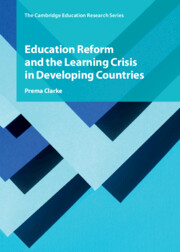Book contents
- Education Reform and the Learning Crisis in Developing Countries
- Education Reform and the Learning Crisis in Developing Countries
- Copyright page
- Contents
- Figures, Tables, and Boxes
- Acknowledgments
- Introduction
- 1 The Learning Crisis
- 2 Donor Programming in Education
- 3 Best Practice and Research in Education
- 4 Creating an Evidence Base for Learning
- Epilogue
- Index
- References
Introduction
Published online by Cambridge University Press: 08 September 2022
- Education Reform and the Learning Crisis in Developing Countries
- Education Reform and the Learning Crisis in Developing Countries
- Copyright page
- Contents
- Figures, Tables, and Boxes
- Acknowledgments
- Introduction
- 1 The Learning Crisis
- 2 Donor Programming in Education
- 3 Best Practice and Research in Education
- 4 Creating an Evidence Base for Learning
- Epilogue
- Index
- References
Summary
Most children in developed countries who finish primary schooling can read, write, and do basic mathematics. This is in stark contrasts with children in many developing countries. Despite billions of dollars spent each year for decades by donors, a large proportion of students in these countries are not learning. In sub-Saharan Africa, 84 percent and 88 percent of students did not achieve minimum proficiency in mathematics and reading, respectively, while in Central and Southern Asia, this figure was 76 percent and 81 percent in the same subjects. Contrast this with mathematics and reading in Europe and North America where only 14 percent did not attain minimum proficiency in both subjects.
- Type
- Chapter
- Information
- Publisher: Cambridge University PressPrint publication year: 2022

